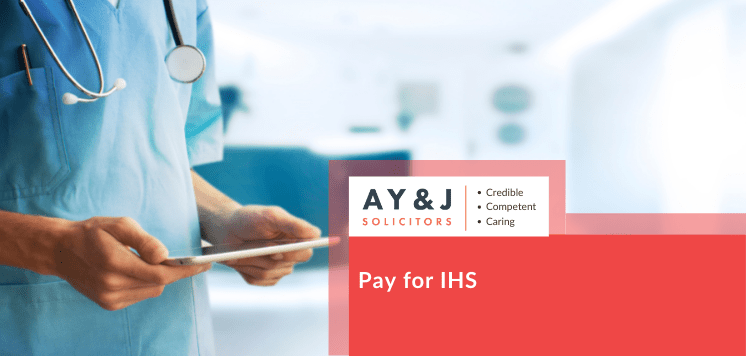Disclaimer: The information in this blog is accurate as of its publication date. Any updates after that date are not reflected here.
The Immigration Health Surcharge, commonly abbreviated to “IHS”, is a fee that you must pay as a part of your visa application.
The Immigration Health Surcharge was introduced in 2015.
When you pay Immigration Health Surcharge, you can make use of the National Health Service (NHS) in the UK.
The amount of IHS payable depends upon the visa and immigration route you are applying for.
The income generated from the Immigration Health Surcharge goes directly to general UK government funds and is then distributed to devolved health administrations.
This blog covers everything you need to know about the Immigration Health Surcharge and its refund process.
Table of Contents
Establishment of the IHS: Legal Foundations
The Immigration Act 2014 section 38 is the source of law (primary legislation) that gives the government the legal authority to levy the immigration health surcharge. The surcharge is then enforced through an “order” or “statutory instrument” (secondary legislation).
The ‘Immigration (Health Charge) Order 2015’, was the first statutory instrument made to enforce the IHS. The order directs:
- when the IHS is to be paid
- who needs to pay
- how much should be paid
- exemptions (including transitional arrangements)
- and consequences of non-payment.
Initially, the Health Surcharge was set at £200 for qualifying applications made on or after 06 April 2015, with the exception of students and student dependants, who had to pay £150 per year.
Over time, the government has made amendments to the original order – at one point, doubling the surcharge across the board.
In 2020, the Immigration Health Surcharge was increased to £624 per year for most applicants, with minor applicants charged at £470 per year. Students, student dependants and Tier 5 Youth Mobility Scheme applicants continue to benefit from a reduced charge (£470 per year).
Under the section of the Immigration Rules that governs “how to make a valid application for leave to remain in the UK” it is stated:
‘Where the applicant is required to pay the Immigration Health Surcharge, this must be paid in accordance with the process set out on the visa and immigration pages of the GOV.UK website’ (paragraph 34(4)).
Failing to pay the IHS could lead to your visa application to being rejected as invalid.
Who is required to pay the Immigration Health Surcharge (IHS)?
UK visa applicants and their dependants must pay the immigration health surcharge, whether they are applying from inside or outside the UK – unless an exemption applies.
Who is exempted from paying the Immigration Health Surcharge?
The following are exempted from paying the Immigration Health Surcharge:
- Anyone applying for a UK visit visa
- Anyone applying for a visa for 6 months or less
- The diplomats or members of visiting armed forces who are not subject to immigration restrictions and control
- The dependents of a member of the United Kingdom’s armed forces
- The dependants of a member of another country’s armed forces who is exempt from immigration restriction and control
- The applicants applying for a visa for the Isle of Man or the Channel Islands
- The British Overseas Territory citizens residing in the Falkland Islands
- The asylum seekers and applicants for humanitarian protection and their dependents
- The domestic workers who have been found out as the victims of slavery or human trafficking
- The applicants, applying for discretionary leave to remain in the UK as someone who has been found out as a victim of slavery or human trafficking, and their dependants
- Those who are claiming that they were made to leave the UK against their rights under Article 3 of the European Convention on Human Rights, and their dependents.
- Those applying for permission to remain in the UK as the victim of domestic abuse, and their dependants
When should you pay the Immigration Health Surcharge (IHS)?
When’s making the immigration application online, you must pay the Immigration Health Surcharge as part of your application.
If you are applying by post, you need to pay the surcharge online before sending your application. In addition, you must mention the IHS reference number on your application form.
When will you be able to start using the NHS?
You can start using the National Health Service (NHS) when both the conditions are fulfilled:
- You have paid the Immigration healthcare surcharge or are exempt from paying it
- Your visa or immigration application is granted
You are still required to pay for certain NHS services, such as prescriptions, dental treatment, eye tests, etc.
When you want to access healthcare in the UK, you may still need to provide evidence of your immigration status:-
- Biometric residence permit (BRP), if you have one
- Online status using a share code, if you have a digital immigration status
Other categories
Some people need to use the online service to generate an immigration health surcharge (IHS) reference number, but do not need to pay any charges – these include:
- A child below 18 years of age who has been taken into care by a local authority
- A relevant civilian employee at NATO or the Australian Department of Defence in the UK or any of their dependents
If you fulfil either of those conditions, you will not have to pay anything, and the Home Office will give you your healthcare surcharge reference number for your application – you can then use the NHS.
How much do you have to pay?
You must pay:
- £1035 per year for all eligible visa and immigration applications
- £776 per year for a student or Youth Mobility Scheme visa
- £776 per year for visa and immigration applicants who are below 18 years of age at the date of application
Dependents aged 18 years or above will pay the adult fee.
The exact and final IHS that you must pay for your visa depends on how much leave you are granted.
You can also calculate how much IHS you have to pay before you apply using the Immigration Health Surcharge services portal on the government website.
You will pay half of the yearly IHS amount if your application includes a time period of less than six months.
You will pay the full IHS amount if your application includes a time period that is more than six months.
If you do not pay
Having submitted your visa application, you will receive an email from UK Visas and Immigration if you do not pay the Immigration Health Surcharge or pay the incorrect amount.
Once you get the email, you must pay the surcharge within 10 working days if you are within the UK and 7 working days if you are outside the UK.
Can your IHS be refunded?
Yes, you may qualify for a refund if you fall into any of the following categories:
- You have paid twice (IHS paid for a previous application covering the same period of time)
- Your visa application got refused
- You have withdrawn your visa application
Your IHS refund will normally be put on hold if you seek an Administrative review on your visa application.
You may get a partial IHS refund if your visa application is successful, but either of the following happens:
- You got less time on your visa than you had asked for
- Dependents on your visa application have been refused.
You will automatically receive the IHS refund to the card with which you made the payment. Generally, you get your IHS refund within 6 weeks of a decision on your visa application.
You cannot claim a refund if:
- Your visa application is approved, but you do not come to the UK
- You decide to leave the UK before your visa expires, for example, to make a fresh application
- You have been deported from the UK before your visa expires
- You are applying for indefinite leave to remain (you cannot claim back IHS paid for your most recent visa application)
Health and Care Workers
If you work in the health and care sector, then you and your dependents may be eligible to get a refund under certain criteria.
Healthcare paid for by an EU country
You may seek a partial or full IHS refund if you have an S1 certificate registered with any NHS Business Services Authority.
You may also apply for a full or partial IHS refund if all of the following conditions are met:
- You are a full-time student in UK higher education
- Your visa started on or after 01 January 2021
- You possess a European Healthcare Insurance Card (EHIC) issued in an EU country
- You do not work
Conclusion: The Immigration Health Surcharge (IHS) is a mandatory fee associated with the visa application. Failure to pay the IHS can alone lead to a visa rejection.
This blog has covered key aspects around the IHS and should help understand the importance and relevance of the charge when you are making your visa application.









